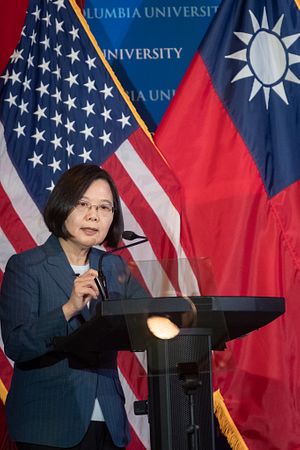China’s “sharp power” has increased significantly in recent years, challenging both the regional and international orders by influencing economies and threatening the national security of democratic countries. This has given rise to both anxieties and vigilance throughout international society. As China’s neighbor, Taiwan stands on the front lines of confrontation with this sharp power. Taiwan suffers intensified pressures daily. Under such circumstances, what could Taiwan do to safeguard the common values of liberty and democracy as well as to respond to national and international changes unseen in decades?
The people of Taiwan have for decades enjoyed a free and democratic way of life, which was forged through the sustained efforts and enormous contributions of numerous democratic pioneers. However, changes in the political environment and economic development, as well as differing mindsets between generations and social groups in Taiwan, together with increasingly severe regional and international situations, all have made it critical to promote transformation in Taiwan.
In response to the current national, regional, and international situation, the Democratic Progressive Party (DPP), the current governing party in Taiwan, embraced a democratic approach by holding comprehensive discussions among generations within the party to produce a progressive framework for the future. The National Party Congress’ September “Resolution on Forging Ahead with the Society together towards Win-win Future among Generations” was the result with the expectation of building broad consensus among generations and ethnic groups in society and further leading Taiwan’s transformation toward a sustainable future.
Under the DPP’s leadership, Taiwan, echoing the United Nation’s Sustainable Development Goals, has been actively taking responsibility together with global partners on human rights, the environment, and other issues toward achieving these goals. Taiwan has done so through a series of regional collaborations under the Global Cooperation and Training Framework and engagement in international activities. For instance, regarding the promotion of human rights, alongside standing with Hong Kong and Tibet, Taiwan has taken the lead in Asia to legalize same-sex marriage. Striving to move toward environmental sustainability, Taiwan has been promoting and implementing green energy transformation policies through cross-border collaboration with international partners. Furthermore, Taiwan has also undertaken the New Southbound Policy to promote regional collaboration with Southeast Asian countries. Taiwan has positioned itself as a vital partner in the United States’ “Indo-Pacific Strategy.”
Despite the fact that Taiwan embraces the values of liberty and democracy as well as contributes its international efforts with a professional and responsible attitude, Taiwan’s international space is still limited by the traditional model of global communication and diplomatic relations. Indeed, the nature of the contemporary interaction model between countries is changing; apart from traditional diplomatic relations, multilateral trade agreements and organizations are also key strategies in international relations today.
Confronting the severe challenges and fierce competition of international relations, as well as echoing the new resolution released by the DPP, Taiwan should re-position itself as “Taiwan of the world,” not only to contribute energies to regional democratic development based on the achievement of democracy and human rights, but also to embrace the vision of a sustainable future to expand and deepen connections and collaboration with the world. In other words, promising approaches for Taiwan to jump out of the current diplomatic dilemma might be breaking the rigid boundary between countries, redefining the interaction model between Taiwan and international society, and further employing a strategic collaboration model through regional alliances or organizational collaborations as alternative diplomatic resources to engage in specific issues.
China actions have countries in the region on edge. From the issue of Hong Kong autonomy to the militarization of the South China Sea, China’s authoritarian behavior has intensified Taiwanese opposition to China’s “One Country, Two Systems” model for Taiwan-China relations. The DPP has thus released its new resolution not only to inspire collaboration among generations to safeguard our democratic homeland, Taiwan, through practical actions, but also to embrace the common values of democracy and liberty to work shoulder-to-shoulder with global partners.
Chih-Wei Chen FRGS is Deputy Director of the Department of International Affairs, Democratic Progressive Party (DPP), Taiwan.

































